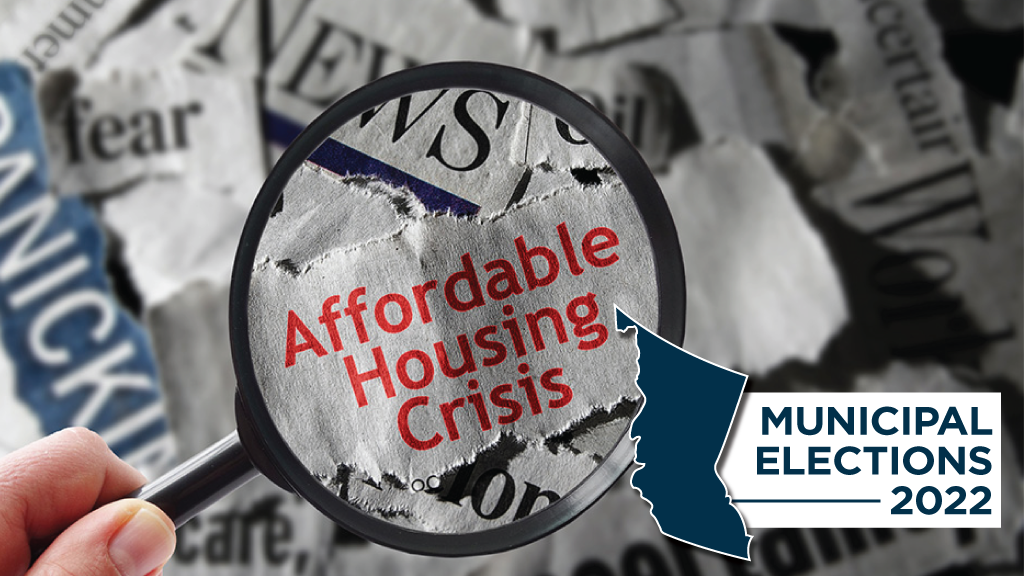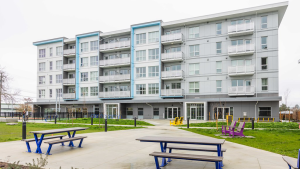Construction leaders want whoever wins municipal elections across B.C. on Oct. 15 to address affordability, density, red tape and skilled trades.
Delays and added costs related to permitting were top of mind for Vancouver Regional Construction Association (VRCA) board of directors chair Craig Mitchell.
“What I see and what I hear from members is we need to reduce red tape at city hall when it comes to building permit submission and development permits. There’s too long a lag right now, a lack of transparency and our members are asking for better timelines, more transparency and reducing the red tape. We’ve got an affordable housing shortage,” Mitchell said.
“Our members are ready to build but without those timelines and visibility on what’s happening in city hall, we need to better streamline it and we support any issues or any measures that accelerate transparency on those permits.”
Independent Contractors and Businesses Association president Chris Gardner echoed concerns about housing affordability and laid the blame squarely on an overly complicated and bureaucratic permitting process.
“Housing markets haven’t been affordable since 2003, which is two decades ago,” Gardner said.
“It’s a generalization, some municipalities are better than others, but amongst our membership Vancouver is seen as the worst. It’s very difficult to do business in Vancouver.”
Gardner also said Vancouver’s possible adoption of a road tax “might sound good in dealing with traffic and greenhouse gases but it will be another cost on the price of construction.”
“Every delivery, tradesperson and every time material is dropped off at site, that will add to project costs. No one is connecting dots and it’s very frustrating. There’s an enormous amount of frustration at the time it takes to get anything done,” he said.
It would be great if they talked to the construction industry first before they enact policy because we need to get on the same page,
— Craig Mitchell
Vancouver Regional Construction Association
Gardner also said the way to answer the affordability crisis comes down to greater housing supply.
“The number of houses put into the marketplace is not keeping up with demand,” Gardner said. “Government is trying to dampen demand and it’s exactly the wrong solution. By increasing supply, you lower the cost of housing.”
British Columbia Construction Association president Chris Atchison said density is key to not only addressing the affordability crisis but an ongoing labour crisis.
“If we’re trying to build homes in Vancouver then they need to be structured in a way that the people who can afford to live there can come and live, work and build in the communities in which they’re living. As it extends out from the Greater Vancouver area, we also need to be careful that the smaller municipalities have the capacity to increase their density,” Atchison said.
Climate change has been an ongoing issue in previous election cycles and Mitchell said in order for the construction industry to help there must be better collaboration between municipal policy-makers and the industry.
“It would be great if they talked to the construction industry first before they enact policy because we need to get on the same page,” he said. “We don’t know if what they’re asking for can be built in the timeframes they’re asking for, so we need a little more collaboration and government and industry need to talk more.”
“We were part of the (climate) problem for many years but we are now the solution going forward. If people want to work in a green industry, construction is now a green industry,” VRCA president Donna Grant said, adding her association and others were ready to speak with municipalities to find solutions.
“VRCA is here to help facilitate conversations and having the opportunity to collaborate with the city and talk about the real issues that matter to our members. Things aren’t going to get done in bubbles or in silos,” Grant said.
Atchison said voters should keep construction in mind as they cast their vote.
“You need to be asking your councillors, your candidates, what their position is on the construction industry. They have to be asking those tough questions, because we are part of the community and we need to be part of the decisions that voters will make on election day,” he said.
BC Building Trades executive director Brynn Bourke also stressed the importance of skilled workers to build and maintain affordable housing and infrastructure while also addressing labour concerns.
“There are a lot of promises being made about new housing and major construction projects in this election. If politicians intend to follow through on those promises, we’re going to need more skilled workers. That means incorporating policies that not only hire skilled tradespeople, but train them as well,” Bourke said.
“Municipalities have a tremendous opportunity to create progressive procurement policies that require apprenticeships and support the payment of fair wages. With a major skilled trades shortage already upon us, it’s the only way we can build the infrastructure necessary on the timelines promised.”
Follow the author on Twitter @JOCFrey.











Time to stop deflecting the problem on to Government and NIMBYism and take a hard look at the private housing sector. The market has failed to provide what is required forcing buyers into two streams, suburban housing and micro condos flogged always with the adjective “luxury.” Governments need to get the industry to enter the 21st century and, like in Europe, take a more direct role in correcting the lack of modern sustainable housing.